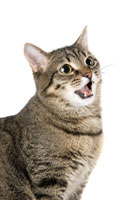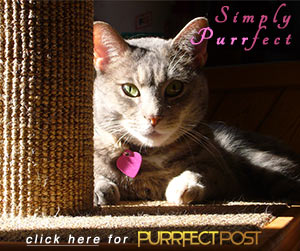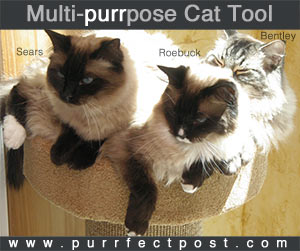Why Some Cats Talk a Lot

It's normal for cats to vocalize, and some do it much more than others. If you share your home with a Chatty Cathy of the cat world, you may be wondering: why does my cat meow so much?
Look Who's Talking
Cats belonging to particular breeds, such as Siamese and other Orientals, tend to be particularly talkative. Cats relate to us as their surrogate mothers (whether we're male or female) and learn to communicate with us to get their needs met. If a particular meow, chirp, or chortle elicits a desired response, they will learn to do it more. Some cats are genuinely social and probably enjoy "talking" with us for companionship. They may even develop a special language that they use just for us.
Of course, there are times that a feline monologue is just not the cat's meow. What's charming in the middle of the day can be infuriating at 3 a.m. Is your cat just lonely and bored? Or is something wrong?
Some of the common causes of extra vocalization in cats are discussed below.
Talkativeness in Cats May Be Attention-Seeking Behavior
Most chatty cats just want your attention. A cat will learn that if she meows long enough, you will feed her, play with her, or wake up and let her into your bedroom. What begins as a simple request can easily become a self-perpetuating demand. Here are some ways to discourage this type of behavior:
- Stop reinforcing it. Hard as it may be, refuse to respond when your cat meows relentlessly at your door. At night, consider closing your cat, along with her food, water, litter, and toys, in a separate room where she's less likely to disturb you. If you consistently ignore her unreasonable demands, they will eventually stop.
- Environmental enrichment. Consider that your cat may be lonely or bored. Many cats spend long hours alone at home with little to do. Introduce daily play sessions with your cat. The games must be interactive and should last for 15-20 minutes. Use a laser pointer, a feather toy, or a similar interactive game that gets your cat moving. Later, she'll be too happy and tired to yowl at your door.
- Reward good behavior. ONLY give your kitty the attention she craves when she is acting calm and quiet.
- Get another cat. In some cases, an age-appropriate feline playmate may be the answer to this type of talkativeness. Younger, more playful cats will often welcome a new companion. It may not be the right choice if your cat is older, fussier, or more set in her ways.
- Consult your veterinarian. Excessive meowing may be a sign of separation anxiety or even a medical problem. If simple solutions fail to help, it's time to consult your veterinarian.
You can find more tips for dealing with cats that cry incessantly at night in this article: "How to Train Your Cat to Let You Sleep."
Extra Cat Vocalization Could Mean Something's Wrong
Most cases of excessive meowing are habitual and benign. But when this behavior develops out of the blue, it may be a sign that something is wrong. A young female that yowls, purrs, rolls, and rubs on you or household objects incessantly may be in heat. A male cat that cries, howls, and strains to urinate may have a urinary blockage, and this is a medical emergency.
Some other medical causes of excessive vocalization in cats include:
- Hyperthyroidism: An overactive thyroid gland, common in older cats, may cause increased hunger, wakefulness, and excitability, making your cat meow more. Other signs include vomiting, diarrhea, increased thirst, and weight loss. Learn more about this illness in our informative article, "Hyperthyroidism in Cats."
- High blood pressure: Cats, like humans, can develop high blood pressure as they age. Felines with this problem often have kidney disease or hyperthyroidism as well. Humans with high blood pressure sometimes have headaches or ringing in the ears. It's thought that kitties may also experience these uncomfortable sensations, resulting in midnight yowling. More information about high blood pressure can be found in "Hypertension in Cats."
- Dental disease: Painful, infected teeth may make it hard for your cat to eat. Mouth pain and hunger may make her clingy and vocal. Signs of dental disease in cats also include difficulty chewing, dropping food, drooling, and bad breath.
- Arthritis: Older cats can develop arthritis just like dogs and people do, and they may not seem to complain. Arthritic cats usually just move around less and do so gingerly. However, midnight yowling in older kitties is sometimes attributed to achy joints. You can learn more about this condition in this article: "Arthritis in Cats."
- Deafness: Elderly cats that are hard of hearing may become louder and more vocal if they simply can't hear themselves talk!
- Feline Dementia: Also known as cognitive dysfunction syndrome, this is a gradual decline in mental ability that affects some feline elders. Signs can include disorientation, altered sleep cycles, house soiling, and bizarre, loud vocalizations. If you notice these signs in your older cat, consult your veterinarian right away. There is no cure for feline dementia. However, there may be treatments that can help dramatically.
You May Also Like These Articles:
Persian Cats: An Interview with Fancy Cat
Training Your Cat To Let You Sleep
Notice: Ask-a-Vet is an affiliated service for those who wish to speak with a veterinary professional about their pet's specific condition. Initially, a bot will ask questions to determine the general nature of your concern. Then, you will be transferred to a human. There is a charge for the service if you choose to connect to a veterinarian. Ask-a-Vet is not manned by the staff or owners of CatHealth.com, and the advice given should not delay or replace a visit to your veterinarian.





